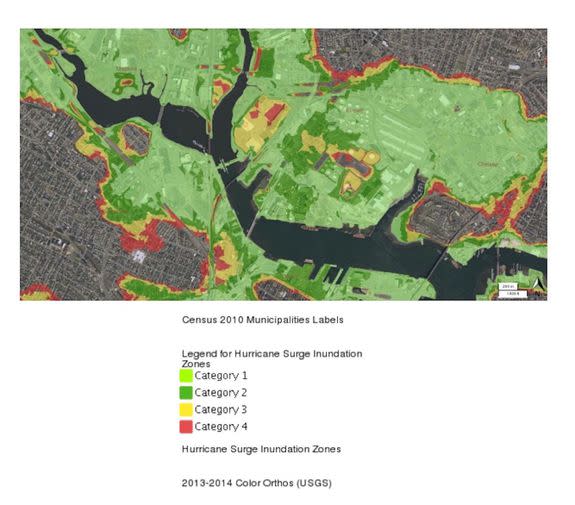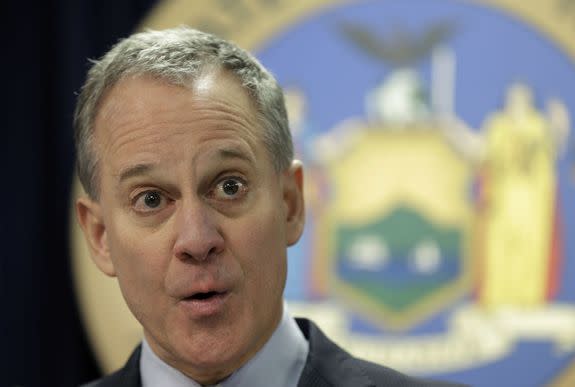The new lawsuit that will escalate Exxon's climate change troubles

Exxon's climate change-related legal problems are growing by the day.
In addition to investigations by several state attorneys general and a separate inquiry on the part of the Securities and Exchange Commission, a new lawsuit filed in federal court on Thursday by a Massachusetts-based environmental group alleges the oil and gas giant has failed to take climate science research (including its own data) into account in operating an oil facility in the Boston area.
SEE ALSO: Climate activists blame Exxon Mobil for largest coral bleaching event on record
The suit, filed by the Conservation Law Foundation (CLF), is significant because it is the first to allege that a private company is violating the Clean Water Act and hazardous waste laws by failing to adequately prepare for climate change impacts such as sea level rise and stormwater runoff from increased instances of heavy rainfall events.
This case could also open the floodgates for more litigation against Exxon and the many other oil and gas companies that operate low-lying coastal facilities.
According to the suit — filed with the U.S. District Court for the District of Massachusetts — the Exxon facility in Everett, Massachusetts, just to the northwest of Boston, has a stormwater drainage system that is easily overrun during extreme precipitation events, which are becoming more frequent due to climate change.

Image: CLF
The suit contends that climate change-fed heavy rainfall is flooding the facility, which emits harmful contaminants into a tributary of the Mystic River in violation of the facility's permit.
The lawsuit rests in part on the investigative reporting of InsideClimateNews, the Los Angeles Times and others that have revealed Exxon studied climate science for decades and knew the global warming-related risks involved in burning fossil fuels perhaps better than any other entity aside from the federal government.
The reporting revealed that instead of incorporating the risks into its planning and being transparent about them, the company chose to fund climate denial groups and withhold its research from shareholders.
The reporting has sparked a public campaign against Exxon, known together with the reporting by the hashtag #ExxonKnew.
The CLF suit takes those findings and applies them to one particular Exxon facility, which stores various petroleum products, nestled within a working class community near Boston.
The low-lying petroleum tank farm, the CLF contends, is already flooding in heavy rainfall events, and will flood from storm surge during a Category 1 hurricane or with modest amounts of sea level rise.
Opening the floodgates
According to Brad Campbell, president of the CLF, “the entire facility is inundated, the entire thing is under water," in even a weak hurricane scenario, based on federal flood forecast tools.
Such flooding could release carcinogens such as toluene, benzene, arsenic and other harmful pollutants present at the facility.
"ExxonMobil has long been well aware of the present impacts and risks of climate change. Despite knowing of the certainty of rising temperatures and rising sea levels since as early as the 1970s, ExxonMobil did not use its findings to prepare its Everett Terminal for such risks," the court filing states.
"ExxonMobil’s knowing disregard of the imminent risks of climate change that threaten the Everett Terminal and its continuing failure to fortify the Terminal against such known risks make ExxonMobil liable for violations of the CWA and RCRA...," the lawsuit contends.

Image: Seth Wenig/AP
“I’m very surprised that EPA has turned a blind eye to this particular facility, and I’m very surprised that the professional engineers who are attesting to the preparedness of this facility have been so cavalier in considering the climate impacts,” Campbell told Mashable in an interview.
The lawsuit could pave the way for many more similar legal actions, and not just against Exxon, but other oil and gas companies too.
"If the suit succeeds it will be an important precedent," said Michael Gerrard, director of the Saban Center for Climate Change Law at Columbia University, in an email.
"America's coastlines are dotted with oil and chemical tanks and other facilities that are at risk from rising seas."

